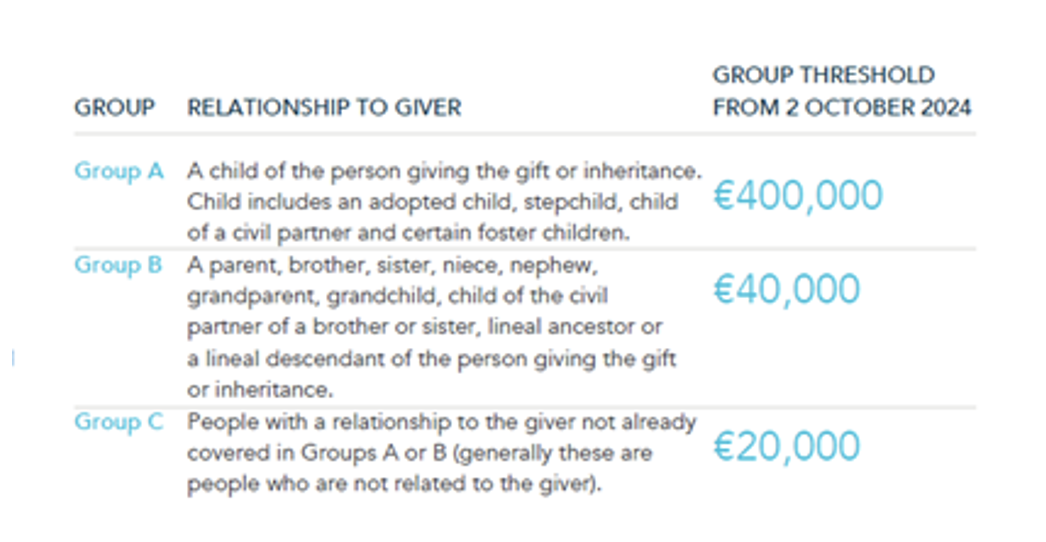Catriona Coady, Head of Tax at Goodbody, and author of A Lasting Legacy: Guide to Inheritance and Estate Planning in Ireland, outlines key insights to support inheritance planning.
The net wealth of Irish households now amounts to €1.2 trillion, made up of €556 billion in financial assets, €812bn in housing wealth, with financial liabilities totalling €163bn (Central Bank). From a financial point of view, Irish households hold more wealth than ever before; therefore, the question of how to manage wealth for the benefit of the next generation is a serious issue for people with property and other assets.
Goodbody’s new inheritance guide has been compiled to help people manage the efficient transfer of wealth to the next generation, with advice relating to estate planning around gift and inheritance tax, the importance of business succession planning, family governance, and the changing nature of families in an inheritance plan. This article outlines some of the key insights from within the guide which will support in ensuring the efficient transfer of wealth to the next generation.
Planning
The overriding message from the guide is to start planning early before it gets too late when plans can be rushed and not as effective as they could be. Those who wish to plan for their estate often don’t know where to start; they may be thinking about it, but can find the conversation difficult. A review of all assets is a good place to start. From a financial planning perspective, this is as simple as pulling together a list of assets and liabilities or “net worth”.
Tax implications
While tax should not be the sole consideration of an inheritance plan, understanding tax is an important point for gift and inheritance planning. Capital Acquisitions Tax (CAT) is the tax that is levied on gifts and inheritances. CAT, currently at a rate of 33 per cent, is payable by the beneficiary of a gift or inheritance once it exceeds the relevant tax-free CAT group threshold. The table below illustrates the CAT tax free tax group thresholds.

Passing on a property
Property ownership is a large component of personal wealth in Ireland – and so, for many, protecting property wealth and passing it onto the next generation is a central part of inheritance planning. When transferring a single residential property to a child, CAT rates apply over and above the relevant tax-free threshold. However, a child may be able to avail of Dwelling House Exemption. This exemption provides that the gift or inheritance of a property can be completely exempt from CAT where certain conditions are met. For example, on an inheritance, amongst other conditions, the beneficiary must not at the date of the inheritance own any other dwelling house or hold an interest in any other dwelling house in Ireland or abroad. The beneficiary, except in very limited circumstances, also needs to have occupied the property as their main residence throughout the three years immediately preceding the date of the inheritance.
The family redefined
It is now more than ever the case that the traditional definition of family has changed. In fact, many of the reasons for wishing to undertake financial and inheritance planning relates to a particular family dynamic that is at play related to a significant financial asset such as a family business. There is no one size fits all approach when it comes to family and inheritance planning. When developing an inheritance plan it is essential that details of the full family history are gathered to ensure clarity on entitlements and to avoid succession disputes.
For more information
For further insights on how to address the planning issues to manage the transfer of wealth to the next generation you can find a copy of the guide here; www.goodbody.ie/wealth_insight/inheritance-guide-2025/
At Goodbody, we work with clients to achieve their desired wealth outcomes, get in touch today.
This is a marketing communication. This document is not to be relied upon in substitution for independent judgement and financial advice. Nothing in this publication constitutes legal, accounting or tax advice, or a representation of the suitability of any product or strategy to your individual circumstances and we recommend that you consult a tax adviser.
Goodbody Stockbrokers UC, trading as Goodbody, is authorised by the Central Bank of Ireland. This document is issued by Goodbody Stockbrokers UC, 9-12 Dawson St, Dublin 2, D02 YX99, Ireland, company reference number 110535.





